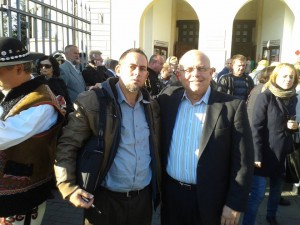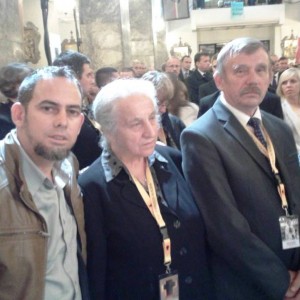
In June of 2013 I travelled for the first time to Poland and made an inevitable visit to the tomb of the Polish martyr Jerzy Popieluszko. All the way from distant Cuba, Popieluszko for me embodied the logical challenge of faith in the face of a totalitarian system that is an enemy of God.
If in life Popieluszko more than fulfilled his pastoral duty of defending his fold against the wolf, in death he showed the world the utter impotence of a regime capable of resorting to assassination to silence a prophet, and clearly put in contrast the borders between good and evil in the Poland of 1984.
My return to Poland in October 2014 coincided with the 30th anniversary of the crime agains Popieluszko, and constituted a theological lesson on the implications of the martyrdom of the saints – in particular, the eschatological truth of the Resurrection and the Christian hope that celebrates as ever-living those exceptional beings such as Popieluszko, even though their remains still rest in their tombs.

This time my pilgrimage was not in solitude in search of a site of mystical quietude, as in 2013. It was more like a grain of sand among compact multitudes who were expressing our admiration and remembrance of the good pastor who did not flee when he saw the wolf approaching. At the same time, we were celebrating the fruit of his sacrifice: democracy and liberty in today’s Poland.
Among the first changes evident after 1989, perhaps imperceptible among many enormous and transcendent transformations, was the inclusion (a happy initiative of Lech Walesa’s) of a chapel in no less than the symbolic Presidential Palace – which would have been inconceivable during the period of totalitarian misrule.
Expression of liberties gained constitutes proof that the physical death of the martyr Popieluszko, rather than rendering him invisible, immortalized him to his people and amplified the values and virtues that he preached and practiced in life.
A radiant sun on Sunday, October 19, provided an extraordinary setting — as if in respite from the harsh, quasi-wintry days of autumn — to thousands of Poles and hundreds of citizens from the world over gathered at the place that guards the remains of the martyr who awaits his resurrection.
It was the natural testimony of the celebration in heaven and on earth honoring the the life that Death did not cut short, an evangelical reaffirmation that there are some who kill physical bodies, but they cannot kill souls. Blessed Poland that has her Popieluszko as a sign that in her, the wolves could not — without pastoral resistance — attack the sheep, who in fact chased away the wolf that attacked their pastor.

Happy Poland for not accepting the lament (in other contexts a fitting one) in “Ring Them Bells” by Bob Dylan: “Oh the shepherd is asleep/ where the willows weep/ and the mountains are filled with lost sheep.” God willing that in any part of the world where, as in Cuba, wild beasts have their lair, there be pastors like Popieluszko capable of facing them down, true to their calling, even — were it necessary — unto the sacred privilege of martyrdom.
Translated by: Alicia Barraqué Ellison
29 October 2014
